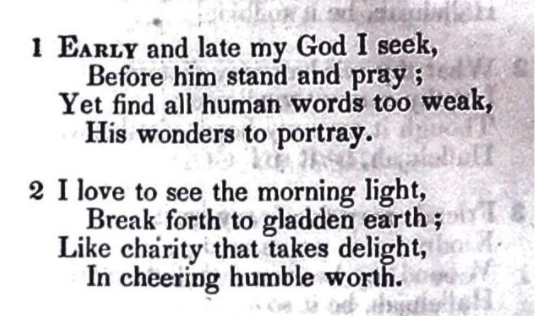Contributor(s): Shared on: 8 November 2021 under the Creative Commons Zero (CC 0) Universal license a Public Domain dedication Categories: Tags: | Contribute a translation | Source (English) |
|---|
|
Rejoice in God, our mighty Rock,
Whose promise, blissful and sublime,
Intrusted to his chosen flock,
Will be fulfilled in future time,
And Israel with glory crown’d,
Shall sanctify His holy Name;
His doctrines pure and truths profound
All earth will then with joy proclaim. | |
“Of nations be thou mine elect,
A priestly kingdom unto me;
Within thy midst the fane erect
Of light, and truth, and charity.
My spirit then will ever rest
On thee, the people of my heart;
My word, our covenant’s behest,
Will never from thy race depart!” | |
Thou hast, Father! faithfully
Kept that paternal covenant,
Protected ‘gainst calamity
And cruel scorn Thy chosen band.
Hast been with them, where’er they dwelt,
And hearkened, when from bitter grief
Before Thine altar down they knelt,
To supplicate Thee for relief. | |
Again we now before Thee stand,
O God of old! with festal glee;
Free children of a glorious land
The covenant renew with Thee.
For tho’ deep error’s heavy guilt
Rests yet upon our heart and soul,
Thy word’s inheritance Thou wilt
That we should guard to life’s last goal. | |
And when religion’s victory
Will all the earth have sanctified,
The heav’nly rule of charity
The hearts of mankind purified:—
Then will all o’er the world resound
Again that holy, awful word,
Proclaimed to us on Sinai’s mount:
”l am th’ Eternal God, thy Lord!” | |
And into ONE great brotherhood
Thar call the human race will turn;
To know Thee to be just and good,
And love each other they will learn
The patient lamb and quiet sheep,
With wolves and lions strong will play;
And heav’nly peace, serene and deep,
Will shed on earth its blissful ray. | |
And all will worship Thee alone,
Our sole Redeemer, God, and Lord!
Contention will no more be known
On earth, enlightened by Thy word.
All men, inspired by truth and love,
With one accord will then exclaim:
“The Lord is ONE in heav’n above,
And ONE on earth His glorious Name!” |
“Rejoice in God, our mighty Rock,” by Rabbi Moritz Mayer, published in 1856, appears under the subject “Pentecost” as Hymn 203 in Hymns Written for the Use of Hebrew Congregations (Penina Moïse et al., Ḳ.Ḳ. Beth Elohim, 1856), pp. 200-201. –Aharon Varady Source(s)
 Ḳahal Ḳadosh Beth Elohim (Hebrew: קהל קדוש בית אלהים, also known as Ḳ.Ḳ. Beth Elohim, or more simply Congregation Beth Elohim), founded in 1749 in Charleston, South Carolina, is one of the oldest Jewish congregations in the United States. The founding members of the synagogue were Jews of Spanish and Portuguese descent (Sepharadim), who arrived into Charleston via London, England. Before 1830 Ḳahal Ḳadosh Beth Elohim was a place of worship for Spanish and Portuguese Jews using Portuguese rituals as done in Portugal before the Spanish and Portuguese inquisitions. A splinter group animated by the European Reform movement, the Reformed Society of Israelites, formed in 1824. While at first this group did not succeed in reforming Beth Elohim, by the mid 1830s Beth Elohim had reabsorbed its members and its ḥazzan, Gustavus Poznanski (1804–1879), joined the Reform camp in 1840. After the first synagogue building was destroyed by fire in 1838, it was rebuilt two years afterward (in a Greek Revival style designed by Cyrus L. Warner) with an organ to the chagrin of the traditionalists. Ḳahal Ḳadosh Beth Elohim is recognized as the oldest Reform Jewish congregation in the Americas.  Rabbi Moritz Mayer (originally Moses Maier, later Maurice Mayer; 1821-1867) born in Dürckheim-on-the-Haardt, Germany, fled to the United States and to New York as a political refugee of the 1848 revolution. In 1859, after seven years as the rabbi of Ḳ.Ḳ. Beth Elohim in Charleston, South Carolina, he returned in poor health to New York where he contributed frequently to the Jewish press, and translated various German works into English: Rabbi Samuel Adler's catechism, Abraham Geiger's lectures on Jewish history, and Ludwig Philipson's pamphlet, Haben die Juden Jesum Gekreuzigt? (the Crucifixion from the Jewish Point of View), et al. In 1866, a number of his English translations of Fanny Neuda's teḥinot in German (from her Stunden Der Andacht, 1855/1858) were published in a volume he titled Hours of Devotion. The work also included a number of his own prayers as well as those of Marcus Heinrich Bresslau. The following year, Moritz Mayer passed away. He was 45 years old.(We are indebted to Anton Hieke for his research on Mayer, " Rabbi Maurice Mayer: German Revolutionary, Charleston Reformer, and Anti-Abolitionist" published in Southern Jewish Life, 17 (2014), pp. 45-89.)For Mayer's translations of prayers by other authors, please visit here. Aharon Varady (M.A.J.Ed./JTSA Davidson) is a volunteer transcriber for the Open Siddur Project. If you find any mistakes in his transcriptions, please let him know. Shgiyot mi yavin; Ministarot naqeni שְׁגִיאוֹת מִי־יָבִין; מִנִּסְתָּרוֹת נַקֵּנִי "Who can know all one's flaws? From hidden errors, correct me" (Psalms 19:13). If you'd like to directly support his work, please consider donating via his Patreon account. (Varady also translates prayers and contributes his own original work besides serving as the primary shammes of the Open Siddur Project and its website, opensiddur.org.) Read a comment / Leave a comment (moderated) Works of related interest: |












Leave a Reply